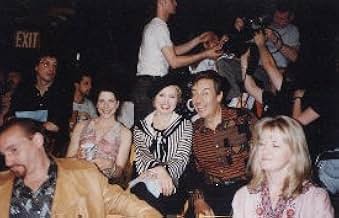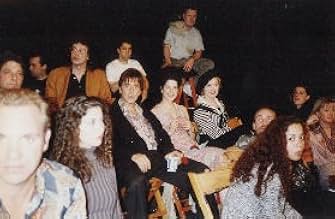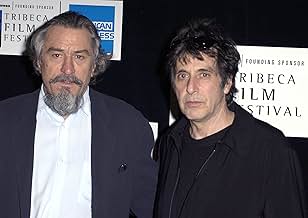VALUTAZIONE IMDb
7,0/10
4885
LA TUA VALUTAZIONE
Harry e Jake, due scrittori di poco successo, passano una serata catartica discutendo di soldi, estetica, amicizia e nuovi lavori.Harry e Jake, due scrittori di poco successo, passano una serata catartica discutendo di soldi, estetica, amicizia e nuovi lavori.Harry e Jake, due scrittori di poco successo, passano una serata catartica discutendo di soldi, estetica, amicizia e nuovi lavori.
Hazelle Goodman
- Cafe Dante waitress
- (as Hazel Goodman)
Recensioni in evidenza
This is the only movie I've ever gone to see twice at a film festival. It played in Toronto at the 2000 film festival, and my friend and I talked about it for hours afterwards. It's an invigorating movie, based on the play by Ira Lewis, about two bohemian guys, approaching 50, adrift in the early 80's, yet stuck in the past.
It's a "talkie" movie that could play on a double-bill with "My Dinner With Andre", a two-hander about a book Pacino has written and the first encounter with his friend, played by Jerry Orbach, since the Pacino character has lent it to him. But it's about so much more than that: it's about writing, dreaming, the creative process, relationships, loneliness, poverty, and finally, values. There isn't a moment that we're not involved with these two guys as they negotiate their relationship. The script crackles with life and wit, observation and nuance. Pacino first directed the great documentary "Looking For Richard", about how to approach staging a Shakespeare play. And here in "Chinese Coffee" he proves once again that he has a natural ability to tell a story in a completely fresh and interesting way, free of the constraints and pettiness of a routine plot.
If you're an actor and you haven't seen this movie, than shame on you, this one will have you going for days. And you'll return to it, too. It's a buried treasure in a great career for Pacino. I can't recommend it any higher.
It's a "talkie" movie that could play on a double-bill with "My Dinner With Andre", a two-hander about a book Pacino has written and the first encounter with his friend, played by Jerry Orbach, since the Pacino character has lent it to him. But it's about so much more than that: it's about writing, dreaming, the creative process, relationships, loneliness, poverty, and finally, values. There isn't a moment that we're not involved with these two guys as they negotiate their relationship. The script crackles with life and wit, observation and nuance. Pacino first directed the great documentary "Looking For Richard", about how to approach staging a Shakespeare play. And here in "Chinese Coffee" he proves once again that he has a natural ability to tell a story in a completely fresh and interesting way, free of the constraints and pettiness of a routine plot.
If you're an actor and you haven't seen this movie, than shame on you, this one will have you going for days. And you'll return to it, too. It's a buried treasure in a great career for Pacino. I can't recommend it any higher.
Eight-time Oscar-nominated, Tony-winning master actor Al Pacino draws from off-off- Broadway this semi-autobiographical character study and boasts a cast of actors who've proved themselves before and after, a Greenwich Village setting, and thus the world of floundering poets, bartenders, belly dancers, photographers, jealous doormen, haughty Shakespearean quotes, urbane coffee shops and French restaurants. And yet not all of these intermingle naturally within the story, but are forced by a tug-of-war between the play Ira Lewis had written and the film Al Pacino wanted to make.
The narrative is almost exclusively as a one-on-one conversation between the two main characters, yet it is littered with various ineffectual camera angles and at times redundant flashbacks that add nothing to the story, which apparently relates the rapport, romance and failure in the pathetic mid-life of a failed writer barely making ends meet as a doorman, that is, until he is fired. It does so as if such cerebral notions of life would pull the emotional triggers they do here between the writer, Harry Levine, played by Pacino, and his friend Jake Manheim, a photographer played by Jerry Orbach. The result is that, yes, some arresting moments and observations are produced, but they feel nonetheless forced. As director, Pacino brings to bear a periodically overwrought utilization of cuts in the dialogue scenes with Harry and Jake, and so perhaps it is not the words themselves, but the prevention of their taking priority that causes them to seem contrived.
Harry visits Jake impulsively because he is desperate for money and Jake owes him some from a long time ago. He doesn't have the money, so the two engage in an all-night conversation about the aesthetics and troubles of their separate trades, past and present loves, and the directions their lives are taking. The play and film are set in New York City circa 1985. Why? I don't know.
After years of withholding it, Pacino allowed it to be released as a part of a three-movie boxed set called Pacino: An Actor's Vision. Though I see why he might not have been happy with his work, the film stands as testimony that art-house and independent films need not be about overrefined individuals, for Harry and Jake are, from what I could tell, animatedly high-handed men who have merely outlived their functions in society. This is decidedly the case for Jake, but whether or not it is for Harry seems the question of the film.
The narrative is almost exclusively as a one-on-one conversation between the two main characters, yet it is littered with various ineffectual camera angles and at times redundant flashbacks that add nothing to the story, which apparently relates the rapport, romance and failure in the pathetic mid-life of a failed writer barely making ends meet as a doorman, that is, until he is fired. It does so as if such cerebral notions of life would pull the emotional triggers they do here between the writer, Harry Levine, played by Pacino, and his friend Jake Manheim, a photographer played by Jerry Orbach. The result is that, yes, some arresting moments and observations are produced, but they feel nonetheless forced. As director, Pacino brings to bear a periodically overwrought utilization of cuts in the dialogue scenes with Harry and Jake, and so perhaps it is not the words themselves, but the prevention of their taking priority that causes them to seem contrived.
Harry visits Jake impulsively because he is desperate for money and Jake owes him some from a long time ago. He doesn't have the money, so the two engage in an all-night conversation about the aesthetics and troubles of their separate trades, past and present loves, and the directions their lives are taking. The play and film are set in New York City circa 1985. Why? I don't know.
After years of withholding it, Pacino allowed it to be released as a part of a three-movie boxed set called Pacino: An Actor's Vision. Though I see why he might not have been happy with his work, the film stands as testimony that art-house and independent films need not be about overrefined individuals, for Harry and Jake are, from what I could tell, animatedly high-handed men who have merely outlived their functions in society. This is decidedly the case for Jake, but whether or not it is for Harry seems the question of the film.
9/14 9:00 am CHINESE COFFEE (*****)
Unlike most films of plays that fail to break free of stagy theatrics, this film draws its strength from a wonderful script and an intimate tone of Off-Off-Broadway theatre. The combination of Al Pacino and Jerry Orbach together for a solid hour and a half could not be more special. Susan Floyd is also wonderful as Pacino's bohemian love. Painter, long time friend of Pacino and "Before Night Falls" director, Julian Schnabel, introduced the film on behalf of Pacino, who had to return to L.A. to shoot a movie.
Unlike most films of plays that fail to break free of stagy theatrics, this film draws its strength from a wonderful script and an intimate tone of Off-Off-Broadway theatre. The combination of Al Pacino and Jerry Orbach together for a solid hour and a half could not be more special. Susan Floyd is also wonderful as Pacino's bohemian love. Painter, long time friend of Pacino and "Before Night Falls" director, Julian Schnabel, introduced the film on behalf of Pacino, who had to return to L.A. to shoot a movie.
A Broadway play turned into a film starring Al Pacino and Jerry Orbach. Think of this script as sort of a "Who's Afraid of Virginia Wolf" between two heterosexual men. In the span of two hours (with flashbacks) layer after layer of their relatively short friendship is peeled away to raw feelings and pseudo-honest expressions until a few truths may have been reached. My only problem with it is in the style of the dialog much of the time feeling the scripts are invisible but right in front of them. The timing is too "ready" and snappy, the comebacks polished, the exchanges sculpted with care. Had it (they) been relaxed, awkward, slow to respond, overly fast to respond, etc., I could've believed it. As it is, I never lost awareness this was a staged play.
Film that was adapted from a play and which shows, with the film delving into the life of Pacino's character along with his friendship with Jake and his life with his lover who has left him. The film is a locked room story, which interspersed with curious editing choices which always elevated the story and kept it interesting. But overall, the film is a great watch for Pacino aficionado's and people interested in the life of writers.
As most of all the movie, is about two friends and what their life amounts to in the end, and all the disappointments and vindications you have about yourself and others.
As most of all the movie, is about two friends and what their life amounts to in the end, and all the disappointments and vindications you have about yourself and others.
Lo sapevi?
- BlooperNear the end of the film Harry is poured a full glass of seltzer with a lime in it by Barney. Although he does not touch it, the glass is empty when he gets up to leave.
- Citazioni
Jake Manheim: I'm exhausted from being exhausted.
- ConnessioniReferenced in Biography: Al Pacino: Inside Out (2001)
- Colonne sonorePalm Court
Written by Aaron Briggs (as Briggs), Alan Briggs (as Briggs) and Paul Williams (as Williams)
Courtesy of Opus 1 Production Music and Amphonic Music Limited (ASCAP)
I più visti
Accedi per valutare e creare un elenco di titoli salvati per ottenere consigli personalizzati
- How long is Chinese Coffee?Powered by Alexa
Dettagli
- Tempo di esecuzione
- 1h 39min(99 min)
- Colore
- Mix di suoni
- Proporzioni
- 1.85 : 1
Contribuisci a questa pagina
Suggerisci una modifica o aggiungi i contenuti mancanti




























